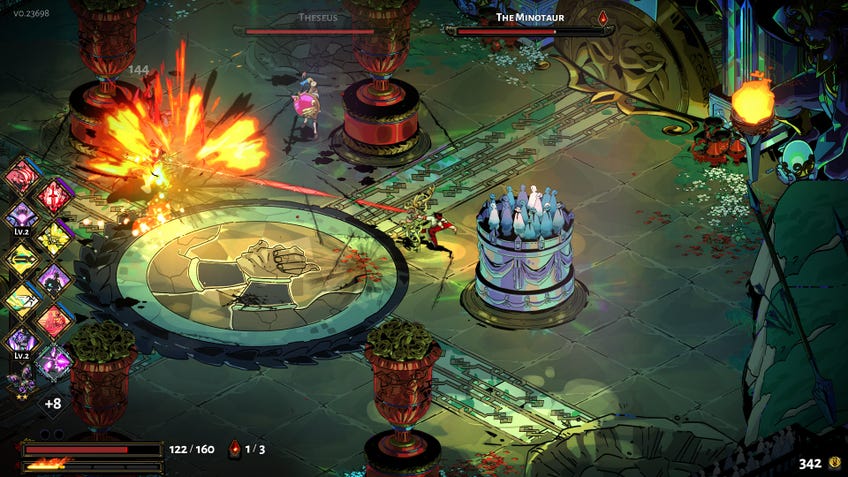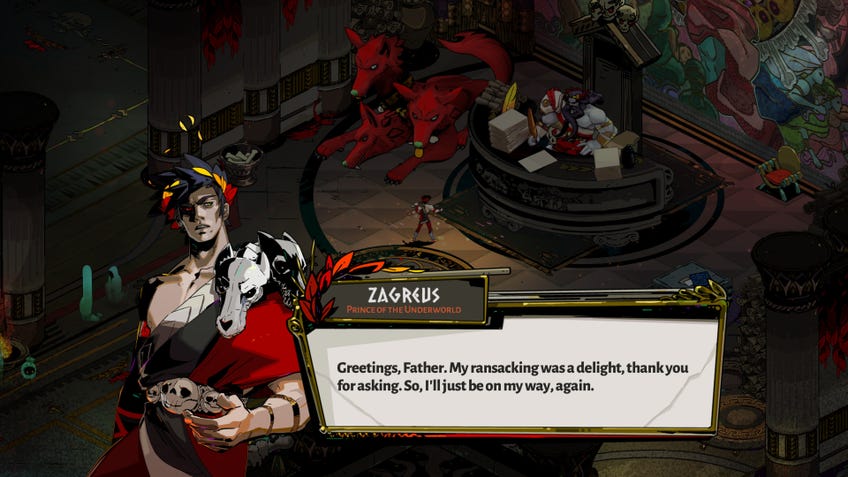Indie video game Hades would make for the perfect co-op board game
Cooperation is a boon.
I love playing Hades, but my hands certainly don’t. An indie video game officially released in 2020, Hades sees one player taking control of Zagreus, the prince of the underworld, as he attempts to escape to Mount Olympus in search of his lost mother. Based on the myths and characters of Greek mythology – think Orpheus and Eurydice, Achilles and Patroclus, that sort of thing – Hades is the kind of unexpected hit that Classics nerds like myself can’t praise enough. However, there’s one big hurdle that prevents me from playing it for too long: the fact that doing so gives me crab hands.
Hades is such an intense video game to play, where one misstep can result in failure of godlike proportions, that I can’t help but clench my poor broken hands around the controller whenever I play. The pain of it led me to put the game down for a long while, choosing to play something that’s a little more merciful on my appendages. Recently, however, I’ve taken to playing Hades with a group of friends couch co-op style, meaning that we pass the controller on whenever we successfully clear a room of enemies. This is an ideal way for me to experience the game because it allows my hands some much-needed rest between clenching sessions. It’s also made me realise that Hades would make for an amazing co-op board game.
Looking at Hades on its face, it’s hard to see how it would work as a co-op tabletop experience. The video game is primarily designed to be single-player, with the little prince who could – Zagreus – going up against the entire underworld and a good chunk of Mount Olympus too. Of course, a tabletop designer could always go down the well-trodden route of enabling players to control a collection of different characters, such as Zagreus’ part-time rivals and lovers Megara and Thanatos. However, this isn’t what I have in mind for a co-op board game based on Hades. Instead, I believe that a tabletop title in which players collectively control the demi-god in his escape attempts would be the best possible adaptation.
The boon element of the video game would translate excellently into a co-op board game.
Hades isn’t just a video game about quick responses and dexterous fingers; it’s also about clever strategy. Players are encouraged to try out new approaches because they’ll be dying and retrying an entire run of levels often. Throughout each new attempt, players can make many choices that can dramatically change their chances of succeeding in escaping the underworld. Having the right weapon equipped or the best charm in hand can make all the difference.

This is what makes the video game such a great co-op experience; players collectively make these decisions, offering their unique perspectives and helping shape this version of Zagreus to be uniquely effective in his own way. It's also what would make it such a great co-op board game, as all the emphasis would be placed on strategy. In a co-op Hades board game, players could collaboratively decide on which weapon to take – each one offering its own advantages and disadvantages – and which of the available charms they want Zagreus to hold onto.
Boss fights could work similarly to Monster Hunter World: The Board Game – if on a smaller and shorter scale.
Boons are an essential aspect of Hades, with every playthrough of the game seeing a series of gods popping up in various rooms to offer Zagreus a bonus to his attacks or abilities. Which boons you decide to take can easily make or break a run of Hades, with much deliberation needed every time the opportunity arises. This element of the video game would translate excellently into a co-op board game, with players having to collectively choose which boons to take and which ones to pass on. If players are clever about their choices, they could end up turning their Zagreus into an absolute powerhouse who shrugs off attacks like they’re nothing. Alternatively, they could end up creating a build that's good in theory but fails to stand up against the many challenges they encounter in each level of the underworld.
Being based on a video game with randomly generated rooms, the Hades co-op board game would obviously involve a good chunk of luck, too. The type and number of enemies players face in each room could be determined by a stack of cards for every level, with the group needing to decide which enemy Zagreus is going to prioritise over the others. Perhaps different weapons could enable Zagreus to do damage to multiple enemies at once, or those that are placed further back in a row of cards. Of course, you can’t forget about the video game’s iconic boss battles, which are also randomly decided from a series of possible opponents. These particular fights could work similarly to Monster Hunter World: The Board Game – if on a smaller and shorter scale – with every boss having their own unique abilities and deck of actions.
Zagreus’ dreams of escaping the underworld are initially scoffed at by his father, Hades, and the god’s many attendees, with the journey he must make seeming almost insurmountable in the face of constant failure. Facing this challenge with other people by your side makes the task feel a lot more achievable, with the combined might of everyone resulting in more and more successes. This is ultimately why Hades would work incredibly well as a co-op board game; after all, everything is easier with friends.


